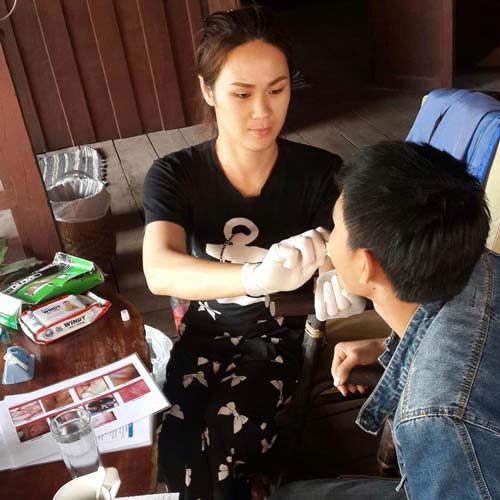- What We Do
- Agriculture and Food Security
- Democracy, Human Rights and Governance
- Economic Growth and Trade
- Education
- Ending Extreme Poverty
- Environment and Global Climate Change
- Gender Equality and Women's Empowerment
- Global Health
- Water and Sanitation
- Working in Crises and Conflict
- U.S. Global Development Lab

A community-based supporter administers the OraQuick test to a client, who hesitated to get tested for HIV due to his fear of needles and concern that people would learn of his sexual orientation. Afterwards, he noted that it did not hurt and was done in his own home. He recommended that his partners have the test as well.
Photo credit: Soukwai Phommaxay, Project Coordinator LaoPHA, Vientiane Capital
May 2016—"You're sexy when you know it. Get tested."
One slogan for the 2015 International HIV Testing Day in Laos playfully promoted a critical phase in the HIV cascade of services.
However, many members of key populations, including men who have sex with men, sex workers, and injection drug users, face multiple challenges such as fear of "outing" themselves as key population members; the potential for harassment, stigma and discrimination by healthcare providers; and concern that their status may not be held in confidence. Many countries also have a severe shortage of providers, which further reduces access to services.
In Laos, LINKAGES is taking both fear of harassment and lack of access out of the testing equation for men who have sex with men and transgender women in three communities. The project introduced a community-based model of HIV testing with OraQuick – a relatively new, rapid oral test that does not require specialized equipment or highly-trained providers. OraQuick increases the number of people who can provide testing and allows key population members to access testing when and where they feel comfortable. This model also relies on trained peers of key population members to administer the test, minimizing fear of stigmatization, and reaches those at high risk for HIV because community-based providers make special efforts to promote testing to their friends and other peers.
To introduce this testing model, LINKAGES Laos first shepherded OraQuick through the approval process for use in the country and held meetings with government stakeholders about the benefits of allowing community-based supporters to administer the test. The Ministry of Health and Ministry of Foreign Affairs were cautious because community supporters are not part of the professional cadre of healthcare providers.
The concerns were that community-based supporters could not be sufficiently trained and that men who have sex with men and transgender women might feel uncomfortable being tested by them. But because of its commitment to reach 90-90-90 goals, the government approved a pilot. LINKAGES staff trained 19 community-based supporters – all key populations members themselves – from LaoPHA, a local non-governmental organization and LINKAGES partner. The community-based supporters learned how to reach out to peers at hot spots and through their social networks to administer the OraQuick test and deliver results and to provide referrals for additional services along the HIV cascade.
"At first I was not sure if I could use OraQuick, and I was tense with my first few uses. I was worried that I would make a mistake in reading the result. I was also not sure if anyone would let me perform the test on him or her, so I had to prepare several talking points," said Annie,* a community-based supporter from LaoPHA Vientiane. "But after my few uses, I love OraQuick – it is so easy and convenient – I can easily carry it and perform the test at any time and place."
After the first three months, community-based supporters proved that they could reach significant numbers of men who have sex with men and transwomen with HIV testing using OraQuick. Between October and December 2015, LaoPHA community- based supporters tested 789 men who have sex with men and transgender women; 773 tested negative for HIV, while 14 tested positive, and 2 were invalid. Out of the 16 people who tested positive or invalid, 5 went on for a second confirmatory HIV test. All 5 were confirmed HIV positive and subsequently enrolled in care.
LINKAGES Laos has since developed more systematic follow-up procedures to increase the number of people with reactive or invalid results who go on for secondary confirmatory testing. Because oral HIV testing by community-based supporters in Laos has proven acceptable, safe and accurate for clients, LINKAGES is exploring the use of OraQuick in Thailand.
*Real name withheld to protect identity.
Additional Links
- Follow LINKAGES on Facebook and Twitter
- Check out LINKAGES on the web
- Read LINKAGES' blog posts
- Visit the USAID Office of HIV/AIDS Website for Key Populations
- Visit the USAID LINKAGES Website







Comment
Make a general inquiry or suggest an improvement.